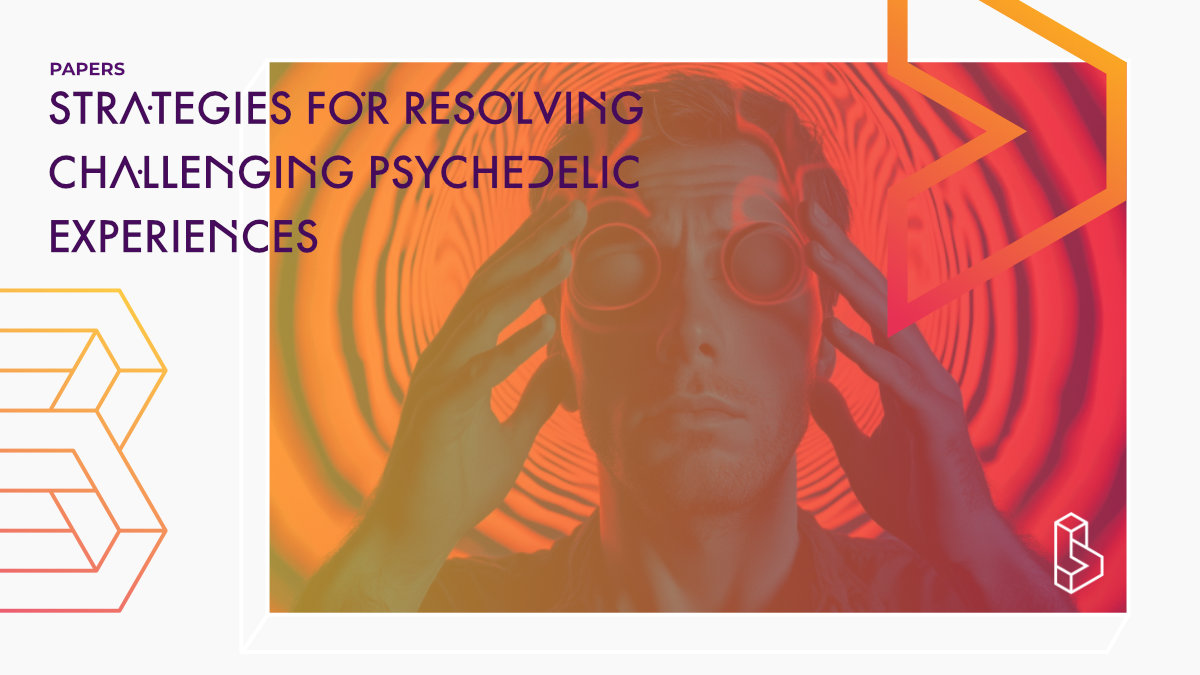This mixed-methods investigation (n=16 psilocybin retreat participants; n=529 online survey respondents) explores strategies for navigating challenging psychedelic experiences and their link to emotional breakthroughs. Three primary strategies—Acceptance and Reappraisal, Sensory Regulation and Physical Interaction, and Social Support and Disclosure—emerged, with the first and third positively associated with emotional breakthroughs. Fear-related challenges were negatively associated with breakthroughs, indicating the need for adaptive coping strategies to optimize therapeutic and safety protocols.
Abstract of Strategies for resolving challenging psychedelic experiences
“Psychedelic substances are garnering renewed interest for their potential therapeutic applications, yet the mechanisms by which challenging experiences during psychedelic use contribute to positive outcomes remains poorly understood. Here we present a mixed-methods investigation into the strategies individuals employ to navigate difficult psychedelic experiences and their relationship to emotional breakthrough. Qualitative analysis of accounts from psilocybin retreat participants (n = 16) informed the development of the Responses to Challenging Psychedelic Experiences Inventory (ReCiPE). In a subsequent online survey (n = 529), exploratory factor analysis of the ReCiPE revealed three primary response strategies: Acceptance and Reappraisal, Sensory Regulation and Physical Interaction, and Social Support and Disclosure. Exploratory correlation and multiple regression analyses demonstrated significant relationships between different types of challenges, response strategies and emotional breakthrough. Notably, Acceptance and Reappraisal, and Social Support and Disclosure strategies were positively associated with greater emotional breakthrough. Fear-related challenges were negatively associated with emotional breakthrough and involved fewer adaptive coping strategies. These findings elucidate the complex interplay between challenging experiences and adaptive responses in psychedelic contexts, offering insights for optimising therapeutic protocols and enhancing safety in both clinical and non-clinical settings.”
Authors: Maximillian J. Wood, Rosalind G. McAlpine & Sunjeev K. Kamboj
Summary of Strategies for resolving challenging psychedelic experiences
The study explores the strategies individuals use to navigate challenging psychedelic experiences and their relationship to emotional breakthroughs. Psychedelic substances like psilocybin, DMT, and LSD have shown promise in treating mental health conditions, yet challenging experiences remain a complex component of their therapeutic use. Such experiences, characterised by distress or negative emotions, can yield both profound insights and potential setbacks depending on how they are managed.
Earlier research highlighted the importance of subjective experiences, such as “mystical” or “peak” states, for therapeutic benefits. However, challenging experiences have been less explored, even though they are often integral to personal transformation. Adaptive responses to these challenges, such as acceptance and surrender, are thought to promote emotional breakthroughs, which involve catharsis or profound psychological insights.
This study employs a mixed-methods approach to address gaps in understanding. The first phase qualitatively analyses accounts of challenging experiences from psilocybin retreat participants, identifying coping strategies. The second phase quantitatively assesses these strategies through the development and application of the Responses to Challenging Psychedelic Experiences Inventory (ReCiPE), examining correlations with emotional breakthroughs.
Methods
Study Design and Ethics
Find this paper
Strategies for resolving challenging psychedelic experiences: insights from a mixed-methods study
https://doi.org/10.1038/s41598-024-79931-w
Open Access | Google Scholar | Backup | 🕊
Cite this paper (APA)
Wood, M. J., McAlpine, R. G., & Kamboj, S. K. (2024). Strategies for resolving challenging psychedelic experiences: insights from a mixed-methods study. Scientific Reports, 14(1), 28817.
Study details
Compounds studied
Psilocybin
Topics studied
Safety
Study characteristics
Observational
Survey
Participants
545
Humans

